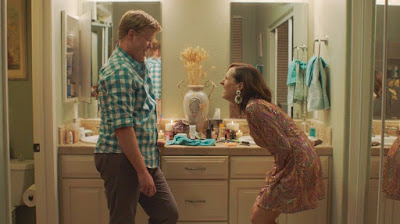MOVIE REVIEW: "Other People'" Redefines the "Cancer Movie"
Only a movie that is autobiographical could be so compassionate in depicting the protagonist screaming at the medicine aisle in a grocery store because he can’t find laxatives. Chris Kelly’s Other People, which is currently streaming on Netflix, is such a film—empathetic, drily humorous, and based in part on his own life. Starring Jesse Plemons, Molly Shannon, and Bradley Whitford, Other People tells the story of the Mulcahey family and how their son, David (Plemons), must come to terms with his mother Joanne’s (Shannon) impending death from cancer without falling apart himself. The movie begins and ends with Joanne’s death—a choice that immediately sets Other People apart from films that deal with terminal illness in a major way, such as The Fault in Our Stars, Me and Earl and the Dying Girl, and 50/50, since we are not allowed to be kept in suspense as to whether Joanne will die. Instead, the drama and tension of Other People comes not from wondering if Joanne will die, but seeing how her family veers into self-destruction with the ever-ticking clock of the movie’s narrative, and the framing of the story within the bookends of Joanne’s passing not letting us off the hook.
(https://www.facebook.com/otherpeoplefilm/)
While Joanne is the character with cancer, the protagonist is David, a gay comedy writer living in New York City whose return to his family in Sacramento is almost as distressing as his mother’s diagnosis. David’s father Norman (Whitford), refused to accept David when he came out ten years prior, and he is increasingly disconnected from his younger sisters, played by Maude Apatow and Madisen Beaty. In an appropriately meta twist, the film itself continually raises the audience’s awareness at the nature of having a story about someone dying of cancer not treat said character as the main focus: throughout the movie, David is reminded of his own self-absorption and inability to acknowledge the feelings of those around him, and that “other people are sad, too.” Even though David’s sisters love him and are struggling with their mother’s sickness, David is too wrapped up in his own work and relationship issues, his quotidian misery enhanced by the perpetual shadow of loss and aching lack of connection with his father. In fact, the climax of the film hinges not on anything that happens to Joanne, but on David’s confrontation of Norman and release of anger at his father’s emotional neglect. David’s stronger relationship is with Joanne, who accepted him when he came out and functions as a confidante, and thus the thought of losing her and having his father be the only connection to his family and childhood home is unbearable.
(https://www.facebook.com/otherpeoplefilm/)
There are moments of levity in Other People, sprinkled over some of the sadder scenes as well as spliced into the narrative as a whole. Providing a key contrast to David, who faced rejection from Norman due to his sexual orientation, Justin (J. J. Totah), the pre-teen brother of one of David’s friends, is out, proud, and even performs a show in drag to celebrate his own father’s birthday—something that clearly fascinates David even as he is shocked by the gesture. Other notes of humor come from David’s own awkwardness as he tries dating in Sacramento, which clearly does not compare to New York City, and little instances of banal brutality intermingling with the tragedy; for example, the opening scene of the movie shows the family curled up on a bed in a darkened room as Joanne breathes her last, only for the stillness and solemnity to be undercut by an obnoxious friend of Joanne’s leaving an oblivious, half-distracted phone message. And who could forget the constant presence of Train’s questionably classic “Drops of Jupiter,” which functions as both diegetic and non-diegetic music, playing at least four times over the course of the film?
(https://www.facebook.com/otherpeoplefilm/)
With the exception of J. J. Totah’s Justin, who mainly hits one exuberant note in his two scenes, the performances in Other People are muted, filled with familiarity and subtext. Shannon, who I knew as a comedian from Saturday Night Live videos, effectively conveys her own fears of dying as well as her fear of what will be left of her family when she is gone. “All I ever wanted was to be a mother,” she whispers to David one morning. The sentiment is heartfelt, but also, unfortunately allows the film’s narrative to reduce her interiority to that of performing her motherly duties, since we don’t see her outside of this context and outside of David’s view of her. Plemons is successful at balancing David’s own narcissistic qualities with a very real-seeming love for Joanne. In particular, the scene where he finally braves his own sadness and rage to call out Norman is extremely painful to watch. Bringing up the rear of the central trio of characters, Whitford’s Norman is hard to understand, though since he is seen through David’s cracked lens, this opaque quality to Norman’s character makes sense. But Whitford is never bad in anything, and he is strong here even though the character is only thinly sketched. While there is no sappy, unrealistic resolution to his relationship with David, the movie’s ending does allow a sense of ambivalence and hope to move forward.
(https://www.facebook.com/otherpeoplefilm/)
Other People accepts its own irony at times, while playing the story and emotions straight at others, creating a uneasy sense of emotional volatility. Are we supposed to laugh at the Mulcahey family’s idiosyncrasies, including that of a relative who tries to use a magic wand from her church to cure Joanne’s cancer? Or should we instead work to reconcile the at-times uncomfortable bursts of humor with the overall tone of the film, because nothing, even loss, is a simple one-note melody? Other People largely succeeds in negotiating this rocky terrain, and in so doing makes the Mulcahey family feel like a real family that could be living next door.




Comments
Post a Comment